|
De Nederlandse schrijver, popjournalist en muzikant Nanne Tepper werd geboren in Hoogezand op 17 januari 1962. Zie ook alle tags voor Nanne Tepper op dit blog.
Uit:De kunst is mijn slagveld
“Groningen 6 april 1993
Beste Marc,
Ben weer eens in een periode van zware neuralgie geraakt. Bezocht voor het eerst in tien jaar een dokter en die gaf mij pilletjes tegen ‘overgevoeligheid’, slappe hemelsblauwe tabletjes die nog het beste werken als men ze inneemt met een dubbele borrel. Morgen ga ik naar mijn oude zielenknijper, om te voorkomen dat ik straks weer rijp ben voor het gesticht. De oorzaak van dit alles? Geluk, en een overdosis aan inspiratie; nu ja, sta je ervoor, dan moet je erdoor, zegt Ome Gerard. Heb ondertussen wel twee prachtverzen geschreven en deze hedenochtend naar Tirade gestuurd, dit blad had ik nog niet eerder met mijn geloei bestookt. Baat het niet dan schaadt het zeker.
Bright Lights, Big City vind ik ook maar een matig boekje, wat dat betreft is Gimmick! even mank: het blijft in goede bedoelingen steken. Neen, dan de laatste van de Ier, Brightness Falls, dat is andere oude wijven, wel een totale rip-off van Tender is the Night van Scott Fitz., maar de eerste helft is magistraal, ondanks de rommelige stijl, op de helft echter – typisch Amerikaans – klaart de stijl op en stort het boek ineen. Toch een diepe buiging voor Jay M. Word strontjaloers van zulke prestaties. Wat echter naar mijn onbescheiden mening Het Meesterwerk
tot dusverre is is Less Than Zero. Dat boek grijpt je bij je kloten en laat je een jaar lang krom lopen van de pijn. Heb nu American Psycho liggen, vertaald door een zeer zachtaardige Limburger, die hier in mijn geboortedorp Hoogezand is ondergedoken, en met wie ik wel
eens in de kroeg zat toen hij deze klus aan het klaren was. Hij werd er op zijn minst zo af en toe een beetje misselijk van. Ik moet nog zien of ik dit boek wel aandurf, gezien mijn huidige staat van ontbinding.
Gaat Zwagerman zich op de Bijlmer werpen? Na een Boeing nu een zweefvliegtuigje. Engagement, tja, kom d’r maar ’s om. Toch is het een aardige jongen. Toen ik hem eens een schop onder zijn kloten verkocht, op papier dan, kreeg ik een uiterst correct briefje terug, dat
vind ik wel van ballen getuigen. Maar mijn proza dat ik naar de Belt stuurde heb ik nooit weer gezien; taal noch teken. Tijdens Herfstschrift, enkele jaren terug, mocht Zwagerman tegen Reugenbrink cq aanzeiken, en omgekeerd. (Met Reugenbrinkcq heb ik schoolgegaan,
hierzo, en zelfs nog toneelgespeeld (Borak valt, van Lodewijk de Boer) – wij waren in die tijd geen liefhebbers van elkander maar die wolkenlucht is later redelijk opgeklaard, zo meen ik althans te moeten denken – zijn redacteurschap bij De eenentwintigste Geeuw heeft me er wel altijd van weerhouden iets naar dat blad te sturen, dom natuurlijk, maar daar zat ook de slechtste schrijver van Nederland, Joost N. en die ging over het proza.”
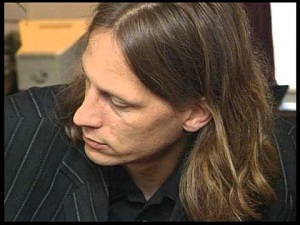
Nanne Tepper (17 januari 1962 - 10 november 2012)
De Amerikaanse schrijver, filmmaker, essayist, journalist en redacteur Tom Dolby werd geboren op 17 januari 1975 in Londen. Hij groeide op in San Francisco, Californië als zoon van de Amerikaanse zakenman en ingenieur Ray Dolby en NARAL activist en fundraiser Dagmar Dolby. Hij studeerde af aan de Hotchkiss School in 1994 en aan Yale University. Tom Dolby’s debuutroman “The Trouble Boy” gaat over betreft een jonge homoseksuele freelance schrijver in Manhattan. Het werd gevolgd door de kostschool roman “The Sixth Form” (2008) die speeltop een eliteschool in Massachusetts. Dolby’s eerste roman voor jonge volwassenen “Secret Society” werd gepubliceerd in oktober 2009 De follow-up “The Trust: A Secret Society Novel” werd uitgebracht in februari 2011.Dolby was samen met schrijfster Melissa de la Cruz co-editor van de bloemlezing essays van “Girls Who Like Boys Who Like Boys: True Tales of Love, Lust, and Friendship Between Straight Women and Gay Men” (2007). In 2012 schreef Dolby de film “Last weekend”die hij samen met Tom Williams regisseerde. Dolby’s werk verscheen in The New York Times, The Village Voice, de San Francisco Chronicle en Out. Een persoonlijk essay van zijn hand werd opgenomen in de bloemlezing “From Boys to Men: Gay Men Write About Growing Up” (2006). Dolby trouwde met zijn partner Andrew Frist in Connecticut in april 2009. Zij zijn de ouders van een meisjestweeling.
Uit:The Trouble Boy
“Two weeks after I moved to New York, I met Jamie Weissman at one of those parties where people don't talk to anyone they don't know already. The living room of the Chelsea apartment was packed with girls in headbands and guys with banker butt, a condition that afflicts first-year investment analysts who spend too much time at their desks and too little time at the gym. We were in the gayest neighborhood on earth, but it wasn't that kind of party.
I knew I had worn the wrong thing when my plaid clam-diggers, perfect for the early September heat, were met with sneers from a group standing in the hallway. Most people were wearing khakis and I looked like I was ready for the beach.
In the kitchen, I poured myself several fingers of vodka and mixed in some off-brand cranberry juice. A guy in a pink Polo shirt and glasses with tortoise shell frames came up to me.
"Ever get the feeling you're at the wrong party?"
I looked down at him quizzically. His curly chestnut hair was receding, more like a thirty year-old's than someone who was probably twenty-two, twenty-three tops.
"Oh, never mind," he continued. "Sometimes I just say whatever comes into my head. I'm sort of ADD that way. I take Ritalin for it."
I never understood people who bragged about the meds they were on. I had been taking sixty milligrams of Paxil every day for the past four years to combat my depression, but I didn't go around telling people about it.
"Hey, can you pour me some of that?" he asked.
I poured him some vodka, and he dropped in a few ice cubes.
"You want a mixer?" I held up a bottle of tonic water. I thought it was obnoxious when people drank booze straight to show off.
"Naw, it's a taste I acquired at prep school. Gets you drunk faster."
"Where'd you go?" I asked. I had gone to a small boarding school in Connecticut, the kind whose glossy catalogs were featured in The Preppy Handbook.
"Oh, it was in Jersey. I was a day student. Actually, most people were day students. But we played all the other prep schools." He sipped his drink. "You're not part of this Princeton crowd, are you? 'Cause I've never seen you before."
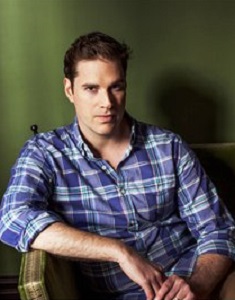
Tom Dolby (Londen, 17 januari 1975)
De Nederlandse dichter en schrijver Ilja Leonard Pfeijffer werd geboren op 17 janauari 1968 in Rijswijk. Zie ook alle tags voor Ilja Leonard Pfeijffer op dit blog.
Uit: Brieven uit Genua
“Ze waren zonder waarden. Niets was waardevol voor hen. Het ontbrak zelfs aan bijtend cynisme. Dat zou nog iets stijlvols of strijdvaardigs kunnen hebben. Toen Tommy, Dimitri en ik voor de grap moralistisch gingen zitten doen over die twee Roemeense hoertjes, was hun gezamenlijke verweer niet meer dan wat betekenisloos gesputter. Daan barstte in de hotellobby zelfs in tranen uit omdat hij bang was dat zijn vriendin erachter zou komen. Nou. Bij dezen. Wat ben je nou voor bohemien met je gegrien achter de cocktail die wij voor jou hebben betaald?
Maar zo waren ze alle drie. Dat was het erge. Een en al existentiële twijfels, jeugdtrauma’s en opkomende depressies. De bloem der natie zat met geknakte nekjes in het duurste hotel van Antwerpen sip aan rietjes te sabbelen van hun majestueuze cocktails. En ze koketteerden met hun zwakte als te vroeg oud geworden decadente dichters uit de vorige eeuw, maar zonder de klasse en met slechts de bleke, improductieve, grauwe teint van een zorgvuldig gecultiveerde vermoeidheid.”
(…)
“Ik wil niet meer leven op papier zoals in deze brieven. Ik wil ja zeggen tegen het leven dat een lichaam heeft en dat oprecht is voor een ander. Daarom is dit mijn laatste brief. Het enige wat ik hierna nog wil schrijven, zal ik schrijven op mijn huid in plaats van op papier, dat ik te lang met mijn huid heb verward, en het zal een enkel woord zijn en het zal het enige woord zijn dat belangrijk is en waar, en het woord zal zijn: sì.”
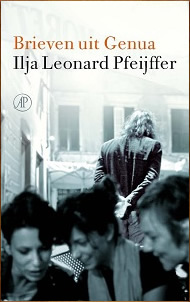
Ilja Leonard Pfeijffer (Rijswijk, 17 janauari 1968)
Cover
De Amerikaanse schrijver David Ebershoff werd geboren op 17 januari 1969 in Pasadena, Californië. Zie ook alle tags voor David Ebershoff op dit blog.
Uit: The Danish Girl
« His wife knew first. “Do me a small favor?” Greta called from the bedroom that first afternoon. “Just help me with something for a little bit?”
“Of course,” Einar said, his eyes on the canvas. “Anything at all.”
The day was cool, the chill blowing in from the Baltic. They were in their apartment in the Widow House, Einar, small and not yet thirty-five, painting from memory a winter scene of the Kattegat Sea. The black water was white-capped and cruel, the grave of hundreds of fishermen returning to Copenhagen with their salted catch. The neighbor below was a sailor, a man with a bullet-shaped head who cursed his wife. When Einar painted the gray curl of each wave, he imagined the sailor drowning, a desperate hand raised, his potato-vodka voice still calling his wife a port whore. It was how Einar knew just how dark to mix his paints: gray enough to swallow a man like that, to fold over like batter his sinking growl.
“I’ll be out in a minute,” said Greta, younger than her husband and handsome with a wide flat face. “Then we can start.”
In this way as well Einar was different from his wife. He painted the land and the sea—small rectangles lit by June’s angled light, or dimmed by the dull January sun. Greta painted portraits, often to full scale, of mildly important people with pink lips and shine in the grain of their hair. Herr I. Glückstadt, the financier behind the Copenhagen Free Harbor. Christian Dahlgaard, furrier to the king. Ivar Knudsen, member of the shipbuilding firm Burmeister and Wain. Today was to have been Anna Fonsmark, mezzo-soprano from the Royal Danish Opera. Managing directors and industry titans commissioned Greta to paint portraits that hung in offices, above a filing cabinet, or along a corridor nicked by a worker’s cart.
Greta appeared in the door frame. “You sure you won’t mind stopping for a bit to help me out?” she said, her hair pulled back. “I wouldn’t have asked if it weren’t important. It’s just that Anna’s canceled again. So would you mind trying on her stockings?” Greta asked. “And her shoes?”
The April sun was behind Greta, filtering through the silk hanging limply in her hand. Through the window, Einar could see the tower of the Rundetårn, like an enormous brick chimney, and above it the Deutscher Aero-Lloyd puttering out on its daily return to Berlin.“
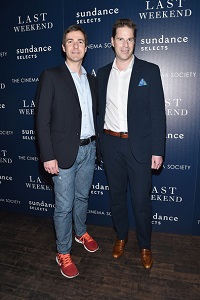
David Ebershoff (Pasadena, 17 januari 1969)
Hier met collega Tom Dolby (rechts)
De Engelse schrijver Gavin Extence werd geboren op 17 januari 1982 in Swineshead, Lincolnshire. Zie ook alle tags voor Gavin Extence op dit blog.
Uit: The Mirror World Of Melody Black
“I don’t know how long I hesitated in the doonNay. In my memory, the moment seems to go on and on - an insect caught in amber - but I’m sure that’s just an effect of hindsight, of knowing what was to follow. The door to the kitchen-Iiving-dining room was ajar and the television was turned up loud. This, I reasoned, was why he hadn’t responded to my knocks. I knocked louder, on the inside of the door, then called his name, but there was still no response. Just the ongoing babble of the television.
Go on or turn back? Curiosity and caution fought a short, bloody battle (more of a bludgeoning, truth be told) and then four and a half steps took me to the half-open interior door, where I stopped mid-stride, left arm aloft and knuckles poised.
Simon was dead. I didn’t need to get any closer to satisfy myself of this fact. He was sitting in an armchair on the far side of the room (about eight feet away), his eyes wide and his back preternaturally straight. But really, it was nothing to do with his posture; it wasn’t even the glazed, vacant stare as the television continued to flicker in his irises. More than this, it was just a feeling of absence, the certainty that I was the only person in that flat. I was a person, and Simon was a body.
My immediate thought was that I needed a smoke, which seemed to arrive simultaneously with the realizations that I’d left my cigarettes in my shoulder bag and there was a pack of twenty Marlboro on the coffee table. And, after all, why not?
Beck hated me smoking in our flat, no matter how far I poked my head out of the window. But it wasn’t as if Simon could have any such qualms. This was a completely reasonable response to the situation in which I found myself. I stepped into the room, removed a Marlboro from the pack - there were seven left – and looked around for a lighter. Since there wasn’t one by the ashtray, the next logical place to check would be Simon’s front trouser pockets. That, however, seemed a step too far. Instead, I lit the cigarette from the gas hob in the kitchen area, taking care to keep my hair away from the naked flame, and then leaned against the counter and started to think."
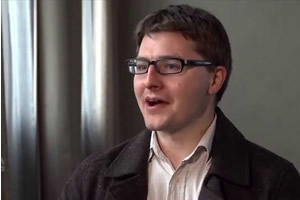
Gavin Extence (Swineshead, 17 januari 1982)
De Deense schrijver Ib Michael (eig. Ib Michael Rasmussen) werd geboren op 17 januari 1945 in Roskilde. Zie ook alle tags voor Ib Michael op dit blog.
Uit: Prince (Vertaald door Barbara Haveland)
“I see a boy. Hard to say how old he is, I'm no expert on children; but he is at the age when the wonder is great and the grief, when something breaks, devastating. The beach is fraught with wind and the world cuts right through him as he comes tearing around the bend, all dog roses, sandy track, and farmsteads, and suddenly finds himself, out of breath, by the sea. It is the best bend in the world and he flies around it with his arms spread into wings.
Farther on, beyond the cliff that rears up, crowned by windblown tufts of sedge and lyme grass, stands the lighthouse. The lighthouse at the end of the world. A delft-blue cap is all that can be seen, sticking up above the cliff side with its drifting sands and foxes' lairs; spy holes in the whitewashed tower and glass all the way around carry the light across white nights in which birds never cease to sing, while the day hovers and grows thin on the horizon.
The sea holds him transfixed. It knocks the feet from under him, whether it is stretching glassy calm as far as the eye can see or thundering against cliff faces and stone dikes that shatter its teeth. A sea that devours sailors and crushes their spirits like eggshells. He can hear it—even when he is asleep in his berth with the timbered walls and the window that lets in the white sky. Distant thunder murmurs when he puts his ear to the wall. He lives in a conch of a house, and the windowsill is spread with his collection of seashells and pebbles.
Nor do I know what place this is, though I have—in my time—seen many like it. A fishing village, with boats on the beach, stones, rollers, and a winch for hauling the boats out of the water. The winch is turned by a fishing stake that has been washed ashore, scoured white, and saturated with saltwater that lends its weight to the wood. It takes one man to brace his chest against the stake, another to keep the dinghy on an even keel as it runs up onto the rollers. Fishing nets are hung out to dry and when the sun hits the live-boxes the airholes shine like silver coins.”
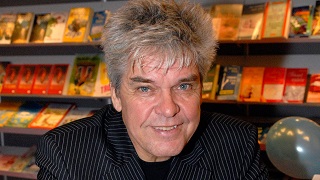
Ib Michael (Roskilde, 17 januari 1945)
De Nederlandse schrijver en schilder Anton Valens werd geboren op 17 januari 1964 in Paterswolde. Zie ook alle tags voor Anton Valens op dit blog.
Uit: Het Boek Ont
“Soms had hij niets bij zich, soms een waszak vol. Hij reed motor, een vervoermiddel dat vreemd contrasteerde met zijn chronische traagheid, die zodra je hem wat beter leerde kennen vlot aan de oppervlakte kwam. Niemand tergde de tijdmeting als Boudewijn. Ook nu weer begon hij een te breed opgezet verhaal over een zeker bezoek aan een ambtelijke instantie en was, toen de minuut ruimschoots verstreken was, vrijwel niet af te stoppen. Je had geen bal aan Boudewijn. Een van de bedoelingen van Man&Post was dat de mannen elkaar zouden helpen met moeilijke formulieren en instantiekwesties, maar Boudewijn was uitsluitend met zichzelf bezig. Hij wist niets en was niemand tot steun.
Toen het met hulp van de anderen toch gelukt was Boudewijn het zwijgen op te leggen, was aan hemzelf de beurt. Sylvio nam de rol van interviewer over en vroeg: ‘Isebrand, hoe zit je erbij?’
‘Goed. Redelijk, dank je, ik sta een beetje strak nu en dan, maar niks abnormaals. Alleen het geld... Als het zo doorgaat, ga ik binnenkort failliet. Ik moet weg, naar de Randstad. Hier is het hopeloos. Maar hoe kom ik hier weg? Daarom val ik soms wat moeilijk in slaap...’
Hij werd onderbroken door de voordeurbel, die tweemaal achtereen hard en schril schelde en zo de fragiele sfeer van vertrouwen en veiligheid schond.
Met de beduimelde hallofoon aan het l-oor herkende Isebrand de gebarsten bas van Cornelis Meckering. Na hun eerste kennismaking had hij niet veel meer aan de organisatieadviseur uit Nieuw-Buinen gedacht, maar hij was hem ook niet helemaal vergeten.
Meckering stapte de woning in, gekleed in zijn wollen mantel, met in zijn tegen zijn borst aan gedrukte handen een dubbele stapel post van angstwekkende omvang, een zware boezem van bankafschriften.”
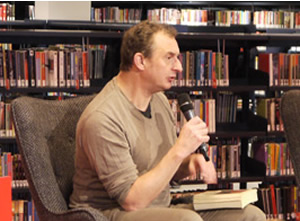
Anton Valens (Paterswolde, 17 januari 1964)
De Nederlandse dichter en schrijver Roel Houwink werd geboren op 17 januari 1899 in Breda. Zie ook alle tags voor Roel Houwink op dit blog.
Erfhuis
In de beslotenheid der oude wanden
hangt zorgeloos uw eenzaam beeld,
boven den vastberaden greep der handen:
een glimlach, beuzel en verveeld.
Uw blik, die eens een vorst ontmande,
is in het bleeke licht vergeeld,
het keurs, dat sluw uw leest omspande,
beurtlings door vocht en zon bespeeld.
Zij laten u in deze schande:
een veil, versleten vrouwebeeld...
En verder grijpen hunne handen
naar wat hun baatzucht reeds verdeelt.
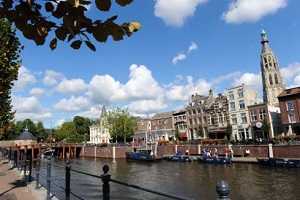
Roel Houwink (17 januari 1899 – 3 juni 1987)
Breda, haven
De Oostenrijkse dichter schrijver Raoul Schrott werd op 17 januari 1964 geboren in Landeck, Tirol (en volgens andere bronnen op een schip „São Paulo“ dat van Brazilië onderweg was naar Europa). Zie ook alle tags voor Raoul Schrott op dit blog.
Uit: Das schweigende Kind
„Erzählenswert ist wohl nur Wirkliches. Um dir jedoch die Wahrheit sagen zu können, muss ich Zeugnis alles Falschen ablegen.
Durch das Rundglas schaute ich zu, wie deine Mutter hin eingerollt, an Maschinen und Schläuche angeschlossen wurde. Die Gesichter der Ärzte bis auf die Augen von Gazemasken verhüllt, breitete man ein grünes Tuch über sie, sodass vom prallen Bauch unten bloß ein Rechteck blieb. In diesem abgemessenen Ope rationsfeld fing dein Leben an, einem keimfreien gefliesten Raum, in dem deine Mutter ihren Körper taub werden spürte.
Drinnen nahm ich ihre Hand; sie ließ los: bleib weg, bleib weg, du bist schuld, die Schmerzen haben einen halben Menschen aus mir gemacht, das wolltest du doch, gib’s zu, murmelte sie. Stattdessen hielt mich der Anästhesist an der Schulter, um mich am Blick über die Schirmwand zu hindern. Ich entwand mich schließlich seinem Griff, um sehen zu können, wie sie dich mit den Füßen voran aus dem Leib zogen.
Eine Steißgeburt warst du, dein Körper voll weißem Schmer, dein Haar kohlig schwarz dagegen. Blut troff von deinem Gesicht, du warst von der Stirn ab darin getaucht, mit der verschmierten Schnauze eines jungen Polarbären, der sich in einer Robbe festgebissen hat, um sie hin und her zu schütteln und auf die Scholle zu zerren, deine Zehen breit gespreizt, als wolltest du mit talgverklebtem Fell gleich davon stapfen, einen Fleischbrocken im Maul, Blut auf den Tatzen und der dahinter in den Harsch gezogenen Spur.
Ein Schwall dunklen Meeres stieg derweil in deiner Mutter auf und nahm ihr die Luft; sie würgte, die Narkose lähmte ihre Lungenflügel: erst da habe ich dich schreien gehört. Zwei Krankenschwestern brachten deine Mutter weg und legten dich mir in die Arme. Du wolltest dich festbeißen, deine Schnauze erneut unter das Eis stecken, dich an meiner Brust festsaugen, bist dabei aber mit deinen Pfoten abgerutscht in meine Achsel, die Armbeuge. So erlagst du zum ersten Mal in deinem Leben einer Täuschung, einem leeren Versprechen.“
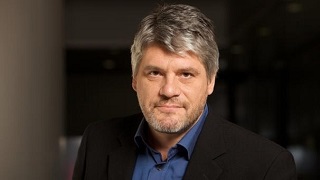
Raoul Schrott (Landeck, 17 januari 1964)
Zie voor nog meer schrijvers van de 17e januari ook mijn blog van 17 januari 2016 deel 1 en ook deel 2 en eveneens deel 3.
|



